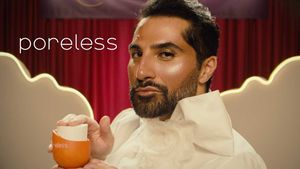 Frank Spinelli, MD, has been treating people with HIV or AIDS in New York's Chelsea neighborhood for about 15 years and is one of the leading HIV specialist physicians, a published author (his memoir, Pee Shy, came out last year) and he sits on the board of GMHC, one of the country's largest organizations working for treatment, prevention, and care of people with HIV. As part of a collaboration between The Advocate and HIV Plus, he sat down to talk about the escalating HIV rates, PrEP, condoms, and why gay men need to talk more about being on bottom.
Frank Spinelli, MD, has been treating people with HIV or AIDS in New York's Chelsea neighborhood for about 15 years and is one of the leading HIV specialist physicians, a published author (his memoir, Pee Shy, came out last year) and he sits on the board of GMHC, one of the country's largest organizations working for treatment, prevention, and care of people with HIV. As part of a collaboration between The Advocate and HIV Plus, he sat down to talk about the escalating HIV rates, PrEP, condoms, and why gay men need to talk more about being on bottom.
The Advocate: A lot has changed since you started, but what hasn't changed?
Frank Spinelli: Unfortunately, what hasn't changed is the number of the new cases of HIV. We've still been consistently at 50,000 new cases each year in the United States despite all the education, all the knowledge, all the information, all the history.
At the same time, we know that over half, 57 percent, of gay and bi men reported having anal sex without a condom at least once in the past year.
There are two subsets that I think fit into this category. One is younger men who have sex with men, and the other is older men who have sex with men--and I would say that's older than 50 and younger than 30. I don't think the younger men have a really clear frame of reference of what AIDS was like 30 years ago. And, secondly, it's not an imminently fatal disease anymore and ... there is this "no big deal" kind of mentality. So if I was a 20-year-old top, I would think my chances were really, really low and I'd probably think the group of men that I am having sex with, also in their 20s, don't have HIV. For the older set, a lot of that is just because they're living longer but also because many of them come out of relationships and start dating again and they fall into practices where they're either getting involved with drugs or partying and having sex with younger men, and they make mistakes. You think that our community would understand more about how we contract HIV, yet we still fall prey to the human error, and that's why the new cases of HIV are still consistent at 50,000 a year.
There's a misconception about HIV because things have improved.
The treatments have gotten better, but we're no nearer to a cure, no nearer to a vaccine, and even though you are going to live a longer life, you're going to live a longer life with HIV, and that means antiretroviral medication. I don't know anybody that wakes up and says, "Oh! I'm so glad I have these HIV medications I have to take every day." The younger generation right now is looking at a very long life of HIV when you seroconvert in your 20s. And we've seen the other side effects: kidney problems, bone problems, higher instances of lipodystrophy. These are all things we have to contend with, so why not have conversations about safe sex and getting tested? We still don't get tested frequently. It's amazing to me that gay men don't want to get tested. And now that we have rapid HIV testing, where you don't wait a week for results and you can do it at home [with OraQuick] all of these things are tools, so why not use them?
A recent survey from the Center for HIV Education Studies found that 10 percent of men on Grindr have never even had an HIV test and a third of them tell their potential partners that they're HIV-negative. That's several hundred thousand men who don't know their status but do claim to be negative.
They don't even know their status to begin with; they don't get tested, they don't want to know, and I think you can make that argument for a lot of diseases. I take care of people all the time who don't even want to get screened for cancer, and I know women who don't have mammograms or pap smears. People are afraid of knowing things.
We understand Grindr is very successful. It's an easy way to meet instead of going to bars or clubs. What better approach than just to say, "OK. Let's just stress the important things like getting tested." If you are sexually active with many different people or a few people, go get tested every month or three months, and certainly, if you ever have an accident, go to the doctor immediately. Then let's talk about prevention. Condoms, yes. It's, again, stressing the arsenal of ways you can prevent diseases, and PrEP is just one of them that we have to at least talk about.
We don't really talk about the bottom-shaming that happens in this conversation about PrEP because no one really talks about the power dynamic here: Only one person wears the condom, it's the top that puts on the condom, and in that drunken moment or that hypersexual moment or whatever, it's the bottom sort of left hoping or demanding that he does.
It's interesting because when I first came out, that was the immediate question people asked you: "Are you a top or a bottom?" And it was so confusing. It was like you had to make so many decisions right away. Many people know automatically and others have to figure it out, and you would think that after all these years there would be less of a stigma--we call it bottom-shaming--but there is. People don't want to talk about their status. Gay men [will say], "I don't want to talk about whether I'm a top or a bottom -- I just have sex." The person who is the receptive partner has to say, "OK, I am at the highest risk for contracting HIV, I'm going to go in and ask my doctor about this." And then they feel shame about that. I believe that while Truvada is not the answer to halting the AIDS epidemic, we have to acknowledge that condom usage has dropped off and that in moving forward, we have to consider a variety of safe sex practices. So that means condoms and maybe Truvada.
So let's go back and unpack a couple of these arguments against PrEP. One of them says, well you can either take a daily pill now while you're healthier or you can take a daily pill after you get HIV?
If you take PrEP now, before you have HIV, it's almost 99 percent effective. PrEP is not for everyone. It's indicated for specific groups. If you're in a high-risk category, let's say your partner is positive, PrEP may be a very good thing for you. There's a cost involved; you have to have insurance. If you don't have insurance, you have to get, maybe, assistance from Gilead Sciences. It's not for everybody, and if you don't take it daily, it's not as effective. So it's definitely a conversation you have to have with your doctor. I don't think all doctors want to deal with and PrEP or HIV. So it's about finding the right fit for you, and I can't stress that enough. I encourage patients to have that conversation, and if they can't, then go to forums or meetings and read online.
San Francisco's HIV rate has just declined, and at the same time the rates of oral and anal gonorrhea, syphilis, and other STIs have increased. One of the arguments against PrEP is that those rising STIs, especially syphilis, will facilitate the further spread of HIV, possibly to an extent that exceeds any prevention benefit realized from PrEP.
The answer to that is HIV is contracted through the exchange of bodily fluids and primarily through intercourse, whether it's anal or vaginal. STDs like gonorrhea, chlamydia, and syphilis and herpes, you can get through just sexual contact. That includes oral sex sometimes, even through kissing, and so they're much more easily transmitted. If you do have syphilis or herpes and you have open sores, yes, it would be easier for you to contract another STD. I think if you are practicing safe sex, and I am talking about intercourse, you're going to minimize your chances of getting HIV and hepatitis C. So I don't know if I can necessarily link those two together as a statement. I think if people are using PrEP or condoms, their risk of HIV is going to go down, and as you can see in San Francisco, that's what happened.
Another thing that we hear about PrEP is that we may be accidentally creating a drug-resistant HIV. Is there truth to that?
Well, if you started taking it and you already had HIV, that would be a disaster. PrEP is indicated for people who don't have HIV, and you need to see a doctor who understands what PrEP is and prescribes it only to people who do not have HIV and tests them routinely. If you are not taking PrEP appropriately, if you are missing doses, you're leaving yourself susceptible to contracting HIV, and if you [contract HIV and] are not on a full antiretroviral regimen, you could then develop resistance to Truvada and that would cause you to have a drug-resistant strain. So there are areas where, yes, that could happen, but not if it's being taken appropriately and given to the appropriate people.
I see a lot of parallels between the birth control pill and PrEP. A lot of the arguments against PrEP sound like the arguments people had against the pill, like, Why would you take a daily preventive pill for something you don't do every day?
I read where people have made this analogy between PrEP and birth control, and I can understand it, and it did have the same shame effect to it. If you were a woman and wanted birth control, you were considered a whore. [Laughs] And that was one way of frightening women into not taking birth control.
You say there's a better comparison, though.
Yes, PrEP itself is not exclusive to HIV. We do malaria PrEP. If you go to Africa, doctors put you on malaria pills before you go -- you take it while you're there, then you take it for about a week after you return. We do PrEP for many other diseases. I think we just attach the sexual stigma to it because it is contracted through sex, and I think it's really a calculated endeavor to make men, especially gay men, feel bad about themselves once again.



 Frank Spinelli, MD, has been treating people with HIV or AIDS in New York's Chelsea neighborhood for about 15 years and is one of the leading HIV specialist physicians, a published author (his memoir, Pee Shy, came out last year) and he sits on the board of GMHC, one of the country's largest organizations working for treatment, prevention, and care of people with HIV. As part of a collaboration between The Advocate and HIV Plus, he sat down to talk about the escalating HIV rates, PrEP, condoms, and why gay men need to talk more about being on bottom.
Frank Spinelli, MD, has been treating people with HIV or AIDS in New York's Chelsea neighborhood for about 15 years and is one of the leading HIV specialist physicians, a published author (his memoir, Pee Shy, came out last year) and he sits on the board of GMHC, one of the country's largest organizations working for treatment, prevention, and care of people with HIV. As part of a collaboration between The Advocate and HIV Plus, he sat down to talk about the escalating HIV rates, PrEP, condoms, and why gay men need to talk more about being on bottom.












































































